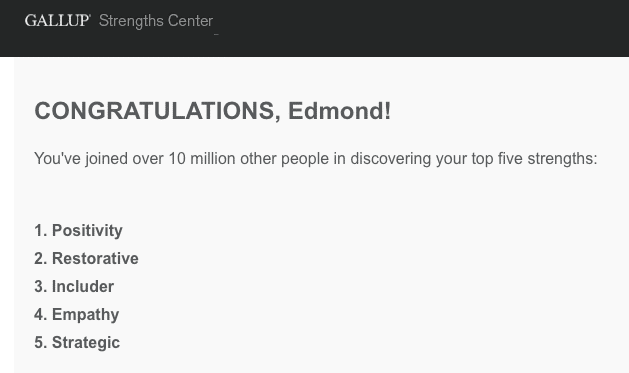
I took a Strengths Finder test a few years ago and it said that my number one strength was positivity.
My number one strength! I couldn’t fucking believe it.
I wasn’t very happy about this because it’s a bit lame really. Definitely not as cool or impressive as say your number one strength being ‘Strategy’. (That did actually come up as my fifth best strength.)
Here’s the results I got:

When someone asks you what your strengths are, you don’t really want to say positivity because what does that even mean?!
Recently though, I’ve started to think differently about this.
It comes up again and again. People often remark that I’m ‘always so positive’ or that I’m the ‘most positive person they’ve ever met’.
So maybe I’m in the 98th percentile for positivity. That’s pretty good right?
Maybe you can’t change your nature so maybe it’s time to embrace it.
I started thinking that maybe this is something I can help people with. Maybe I could teach you how to be more positive.
So here goes:
1. Know that you can always change your mental state
You might have woken up to an argument with your partner and you might have left the house in a bad mood. You can’t shake it off on your commute and you’re still fuming about it at work.
When you’re in a bad mood, the stress hormone cortisol is pumping through your system and it’s affecting your ability to concentrate and be creative.
At its worst, this feeling can last for the whole day.
Think about the craziness of that. A whole day ruined because of an argument.
Now let’s rewind.
Assuming that you weren’t able to resolve the argument before you left the house, you have to find a way to shake off that bad mood as soon as possible.
If you can’t, then you’re not in control of your emotions. Your emotions are controlling you.
Compartmentalise. Try to put it to one side. Your home’s side. Your domestic side.
Or choose to view the argument in a different way.
Look at it from a more positive point of view. The argument has raised important points that it’s better that they’ve been raised rather than allowed to fester. That realisation is where progress comes from. Or that it’s going to be resolved soon and your relationship will be the stronger for it.
You’re in control of your thoughts and your emotions. Don’t be a slave to your emotions. Control them instead.
2. Know how to whip yourself up into a higher energy state
Energy and your mental state are very closely related.
Think about it. When you’re feeling sluggish and low-energy, do you feel positive or negative?
You could be faced with the same situation, but if you come into it with high energy, you’re more likely to feel positively about that particular situation.
On the flip side, if you come into that same situation feeling groggy, then you’re less likely to feel positive about that situation.
Look at how boxers or MMA fighters come into the arena. They’re jogging on the spot. They’re throwing out combinations of punches. They’re jabbing the air. They’re tapping themselves in the face. Whipping themselves up into a higher state of energy, readying themselves for the fray ahead.
Or look at Tony Robbins before he comes on stage. He’s jumping on a trampoline, breathing deeply, big smile on his face, geeing himself up just like a boxer does. And it works.
In the mornings, try going for a short jog with a sprint finish or go to the gym and lift some heavy weights. Or if you don’t have time, simply get on the floor by your bed and do push ups until fatigue. Then sing loud along to your favourite song.
You can control your energy levels. Try the tips above.
3. Think about why you’re a lucky bastard
If you think you’ve had a bad day, try this exercise. It’s pretty similar to Gratitude.
I use this on my wife when she’s down.
So for example, in the heat of summer, our flat is super hot. It’s around 31 degrees right now. Now we could moan about this, and say how bad our lives are right now.
But I always say, stop being a moaner. At least we’re not in Iraq right now fighting wars in 50 degree heat, with 100lbs of kit and no water. Compared to that, we’re pretty goddamn lucky.
Or I think about how lucky I am to have two legs, a good brain, all my senses intact, some skills and knowledge, how lucky I was to have great parents and a great sister who cared for me and gave me a great education or how lucky I am to have a great wife who looks after me and loves me, or to have great friends who I’ve known all my life, or have a good job or to have the ability to travel and to be free of mental and physical illness.
Think about why you’re a lucky bastard and do this exercise every day and whenever you’re down.
Start from the beginning:
You’re lucky that:
- You’re alive!
- You have a roof over your head
- You’ve got friends (hopefully)
- You’ve got a family
- You have some money
- You have food
- You live in a free society (hopefully)
- You have a working mind
You carry on. After about ten items you’re lucky for, you’ll start to feel really good about yourself and your situation. Repeat daily.
4. Improve your self talk
I hear so much bad self talk every single day.
A colleague might say ‘I can’t do that. I’m not good enough.’
My wife might say that she’s ‘feeling fat’.
And these are just the words they say out loud. To another person.
Can you imagine what they say to themselves in their own heads?
Why are they so harsh on themselves?
Now you might say that maybe what they’re saying is true. But I can tell you that it’s never really true.
Language is so important and the words you use can have good and bad effects on you and the people around you.
Let’s go back to the previous examples:
My colleague could have said, ‘I’m not sure that I could do that yet but I’m sure I could learn.’
Doesn’t that sound more positive? Do you think my colleague would be more upbeat after saying that than the words ‘I can’t do that. I’m not good enough’?
Start reframing the way you talk to yourself.
Instead of ‘I can never lose weight because I’m destined to be a fattie’ why not reframe it and say ‘I’ve never found it easy to lose weight but this time I’m going to follow a new eating and exercise plan and I’m going to lose weight.’
Instead of saying ‘I can’t learn a new coding language because I’m not clever enough’ say ‘I will find the right training programme that will fit the way that I learn best and I will learn whatever I put my mind to’.
Improve your self talk now. Whenever you catch yourself giving yourself bad self talk, stop and reframe.
Talk to yourself the way that you’d give encouragement to your best friend or your child.
You wouldn’t crush them would you? Of course not; you’d motivate and uplift.
Do the same for yourself.
5. Know that you could learn whatever it is you put your mind to
I suppose this is actually a form of confidence but I do feel that I could learn anything that I put my mind to.
Now that might not be objectively true because maybe quantum physics is actually beyond me. But I do believe that if I worked on it for 100 hours and got the best teachers and they found a way that I could relate to the material best, then I could have a decent grasp of the subject.
Rightly or wrongly, that’s my belief.
This is also known as a Growth Mindset, first coined by Carol Dweck.
She contrasts a fixed vs a growth mindset.
A fixed mindset is where a person believes that their abilities and personalities are largely ‘fixed’ and unchanging. Those are just the cards that you’ve been dealt. When you succeed, you attribute that success to your innate abilities and when you fail, you attribute that failure to your innate lack of abilities. Failure is seen as a reflection of your fixed abilities. Think of the person who believes they lack artistic talent. ‘I can’t draw. Never been good at it. Never will be.’
A growth mindset on the other hand believes that abilities are not fixed. They can grow or recede. They might be bad at drawing but faced with needing to become better at drawing, they will find a course and learn how to become better at drawing. They will believe that their drawing ability can improve.
Which do you think will make you more positive?
Growth mindset of course.
Imagine your life with a growth mindset.
You’d be planning a trip to Spain and with 4 weeks to go, you might buy a beginner’s guide to Spanish, because you’d be confident in your ability to learn some Spanish.
You might not be a good swimmer but one day you decide to learn once and for all.
A growth mindset just opens up possibilities and horizons for you. Isn’t that better than walking round with a fixed mindset all the time?
To move from a fixed mindset to a growth mindset isn’t easy but the best way is to look at people you know who you know didn’t have that much talent in a particular field but still became good at it.
Okay not Tiger Woods as you might think he has innate God-given talents (even though he has practiced for tens of thousands of hours since he was 18 months old).
I knew a guy at university had never played golf before university. But he fell in love with the game and all his friends played golf. He decided that he wouldn’t settle for being an average golfer. He took serious lessons and he practiced diligently. In two years, he was down to a six handicap. (That’s really good by the way)
When you think about people like my golfer friend, that’s when you realise that maybe abilities aren’t so fixed after all.
Take inspiration from his example and go after what you want.
Here’s a great article from Brainpickings about the difference in the two mindsets.
6. Know that you can always change your situation
Okay maybe not if you’re in prison.
However, assuming you’re not in prison, you can always change your situation.
Not enjoying your job? Change your job.
In a relationship you’re unhappy in? Leave that relationship.
Not that easy you say? Why isn’t it?
When did you become so helpless?
It’s like the story of the elephant and the rope.
A guy walked past an elephant in a circus and was amazed that this huge creature was held by a small rope on one of its rear legs attached to a tiny pole in the ground. He wondered why the elephant didn’t just walk off effortlessly pulling the rope and pole out of the ground.
He asked a circus worker why this was the case.
The circus worker replied that the same rope had been around the elephant since he was a very small baby elephant. At that age, the rope was enough to keep him from escaping. After trying a few times, he realised that he couldn’t break free of the rope. So he stopped trying. Even now, as an adult elephant and now easily strong enough to break free of a hundred ropes, he doesn’t believe he can, so he doesn’t even try.
Sad story eh?
Now let’s go back to the earlier examples.
Don’t think you can change your job? What’s your invisible ‘rope’? Is it really that hard to change your job? Pull out the figurative rope and pole. Look for new jobs and apply to them. Put enough effort into it and you’ll find a great new job.
Can’t leave your relationship? Do the right thing and have a conversation with your partner. Tell them you’re not happy at the moment and tell them how you feel. You’ll either improve your relationships or you’ll end the relationship (or maybe they will).
Know that you can always change your situation.
7. Enjoy being around people. Enjoy your fellow man.
I love being social. I can’t be social all the time – like most people, I need time to myself. But on the whole, I like to be around people.
Be happy to see people you know. Give people hugs, greet them with a big smile and tell them it’s great to see them again. Ask how things are. Give them a gentle tease if they can take it.
Organise dinners, parties, BBQs, reunions, poker nights, booze ups, anything. Be a giver not a taker.
8. Surround yourself with positive people
And if you can’t find them, find them online.
I mean on podcasts or on YouTube.
Check out this guy called Charlie Houpert who has a channel called Charisma on Command where he dissects and teaches you how to have much stronger interpersonal skills.
Or Tony Robbins. I’m sure you’ve heard of him.
Or Casey Neistat.
Or Jocko Willink.
9. Eliminate or minimise negative people
The mirror of the previous point. You know someone who is generally negative about stuff. Just cut them out. Energy is a precious thing. Don’t let someone always keep sapping your energy. You’ve worked hard to raise your positivity and your energy levels. Why should the same people bring you down.
Cut them out. Or if you can’t because maybe they’re your family, then tell them not to be so depressing. If that doesn’t work, then maybe you need to see them less. It might sound harsh but if you don’t then you will feel way less energetic and less positive than if you did cut them out.
10. Know how your body affects your mental state, both positively and negatively
I’ve written earlier blog posts on how your body affects your mind.
We saw from Amy Cuddy how great posture can affect your confidence levels. Think about the dominant pose before an interview. How posing with your arms aloft and chest puffed out can increase testosterone in your body. Testosterone, amongst many other things, is the confidence and dominance hormone.
Conversely, we know from Cuddy also that if you huddle up with your shoulders rounded and slightly stooped that you lose that feeling of dominance and you become more fearful.
11. Consume mostly uplifting and positive content
If you read the Daily Mail (Daily Hate), watched only the BBC news channel, listened to old Radiohead and emo, do you think you’d be feeling positive after all that?
Of course not.
What about if you woke up and listened to the overture of The Marriage of Figaro or the overture to Tannhauser?
Then you read a few pages of Tolstoy’s War and Peace. Then you watched an animated book review on FightingMediocrity’s Youtube channel.
Then you read the front page of the Financial Times.
Then you listened to a quality podcast like Jocko Willink’s.
How do you think you’d feel after that quality content binge? A bit better than the previous diet of negativity, right?
Your turn
Hopefully, you’ve learned some useful tips on how to be more positive. Start putting these into action today and let me know how you got on!





